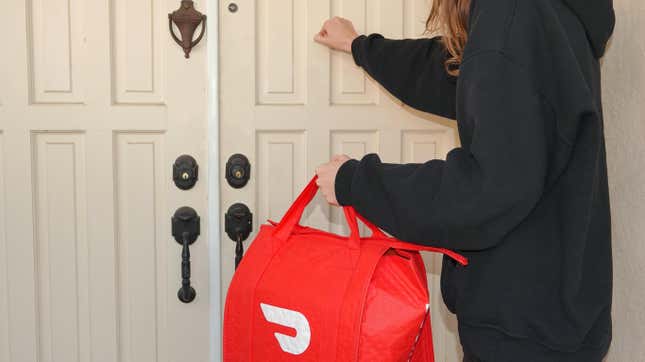
After a rise in minors attempting to buy alcohol via delivery apps during the pandemic, DoorDash has decided to put the responsibility in the hands of both its drivers and its customers, reports Today. The delivery app plans to roll out a two-step system to prevent the sale of alcohol to underage customers, but it’s a process that places too much responsibility on the delivery drivers.
DoorDash’s new two-step verification for alcohol purchases
DoorDash’s two-step verification for alcohol sales will require customers to upload images of the front and backside of their ID to the app. Plus, when the order arrives, the delivery person will need to scan the ID to verify the customer’s identity. This means no alcohol order via DoorDash will be contactless.
The new ID checking system has already been tested in Dallas, Detroit, Miami, Phoenix, Portland, Oregon, Seattle, and Northern Virginia. Setting aside the obvious data grab involved with thousands of customers providing their identity directly to DoorDash, there’s another issue with how DoorDash wants to prevent underage drinking.
DoorDashers are not bartenders
The new DoorDash safeguards require that the driver check for signs of intoxication in the customer. If the customer appears to already be too drunk, the DoorDash delivery driver can decide not to complete the order. This is something professional bartenders do, but they are trained and certified to be able to identify when a customer has had too much to drink. Although DoorDash does provide its drivers with guidelines for making alcohol deliveries, its site also emphasizes that the delivery driver (not DoorDash) could be held liable for delivering alcohol to a minor or a person who is already intoxicated.
From the customer perspective, this could be a big inconvenience if you happen to wind up with a DoorDasher who isn’t sure how to judge how sober you are. Your order could end up being denied even if you aren’t drunk because the delivery driver doesn’t have the right training to make that call.
But the bigger risk is actually on the delivery driver’s end. Imagine a driver identifies a customer as too intoxicated and decides not to complete an order. The only way for the driver to identify that person’s intoxication is to be standing right in front of them, and if that customer becomes angry or upset that they’re being denied their order, it could turn into a dangerous situation for that DoorDasher.
When a bartender cuts off a customer who has had too much to drink, it’s generally to prevent them from drinking and driving. When people order alcohol through delivery apps, it’s usually to the comfort of their own home so they don’t have to get behind the wheel. Asking delivery drivers to make assumptions about a customer they’ll have a 10-second interaction with feels like DoorDash passing the potential blame onto its drivers—workers who, once they decide not to complete a transaction, will most likely get stiffed out of a tip, too.
Although the new system may deter some minors from attempting to snag alcohol via the app, the new measures are a detriment to the people on every side of the interaction. If there’s a solution to be found, this isn’t the one.